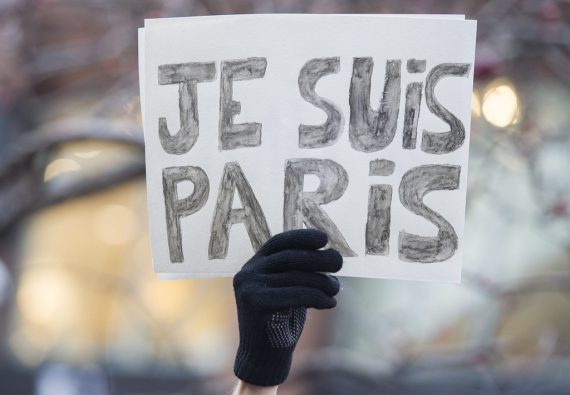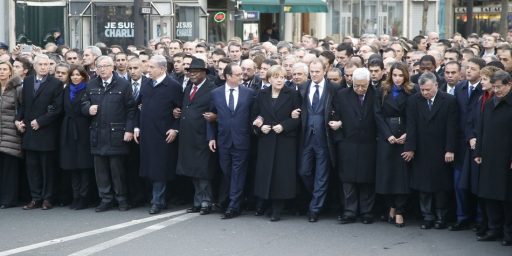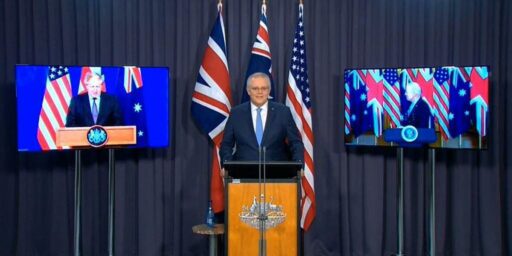Attack on France Is an Attack on the United States
We are legally, morally, and practically obligated to respond. Let's not do so stupidly.
French President François Hollande has declared Friday’s attacks, which killed at least 129 and wounded 352 others, “an act of war that was committed by a terrorist army, a jihadist army, Daesh, against France.” He reiterated that, ”It is an act of war that was prepared, organized and planned from abroad, with complicity from the inside, which the investigation will help establish” and vowed to “be unforgiving with the barbarians from Daesh,” adding that France would act within the law but with “all the necessary means, and on all terrains, inside and outside, in coordination with our allies, who are, themselves, targeted by this terrorist threat.”
President Obama immediately pronounced the attacks ”an outrageous attempt to terrorize innocent civilians,” adding ”This is an attack on all of humanity and the universal values we share.” More importantly, he declared, “We stand prepared and ready to provide whatever assistance the people of France need to respond.”
As has happened so often when outrageous acts occur abroad, Americans are changing their social media profiles in an empty show of solidarity and some are carrying around placards declaring “Je Suis Paris.” In this case, however, we actually are. While I share my co-blogger Dave Schuler‘s skepticism that humanity shares universal values, we are legally, morally, and practically obligated to respond to this attack on our French allies.
Article 5 of the Washington Treaty, which established the North Atlantic Treaty Organization (NATO) in 1949, states, “The Parties agree that an armed attack against one or more of them in Europe or North America shall be considered an attack against them all and consequently they agree that, if such an armed attack occurs, each of them, in exercise of the right of individual or collective self-defence recognised by Article 51 of the Charter of the United Nations, will assist the Party or Parties so attacked by taking forthwith, individually and in concert with the other Parties, such action as it deems necessary, including the use of armed force, to restore and maintain the security of the North Atlantic area.”
NATO’s original purpose was to deter Soviet aggression into Western Europe by committing the United States to action. Article 5 was thankfully never invoked in that cause. The Soviet Union collapsed in 1991, rendering NATO’s original purpose moot. But the organization has continued on with expanded membership and an expanded, if controversial, role in the aftermath of the Cold War.
Ironically, the first and thus far only time Article 5 was invoked was on September 12, 2001 in response to al Qaeda’s attacks on the United States. Rather than the United States coming to the aid of her allies, the reverse happened.
Now it’s our turn.
We’re legally obligated to assist France here to restore and maintain security against an ongoing threat. In light of France’s participation in the fight in Afghanistan in the wake of 9/11, that’s compounded with a moral obligation. And, practically speaking, the attacks in Paris demonstrate that ISIL is not longer a threat localized to Iraq and Syria but one capable of and interested in carrying out violence in the West.
That we have no choice but to act doesn’t mean that we’re required to act stupidly.
As Steven Taylor has noted, ISIL emerged in the aftermath of our invasion of Iraq and destruction of the security situation there. And our decision to wash our hands of Libya althogether after our decapitation of the Gaddafy government left a regional mess.
Jim Stavridis, former Supreme Allied Commander and current dean of the Fletcher School, calls for ISIL’s “eradication.” While a laudable goal, it strikes me as unachievable through the application of armed force. But Stavridis’ plan nonetheless seems prudent. He calls for:
- Assigning the mission to “Allied Joint Force Command in Naples, Italy. This is the command that conducted the intervention in Libya and is one that has significant planning and operational experience, as well as deep connections to coalition partners from the region — the United Arab Emirates, Jordan, Qatar, and others. NATO’s military planners should aim to include not only the alliance’s official members, but also its many coalition partners, including Sweden, Finland, and other regional actors.”
- “NATO Special Operations Headquarters in Casteau, Belgium, should take the lead in organizing intelligence-sharing among member states; it should also prepare the alliance’s joint special forces to be deployed on the ground in Syria to train and motivate anti-Islamic State fighters, gather firsthand intelligence, conduct raids, and serve as spotters for NATO and coalition aircraft.”
- “[T]he current U.S.-led bombing campaign in Syria and Iraq should come under NATO leadership. NATO could then increase the assets deployed in that mission by contributing additional aircraft, troops, ordnance, and AWACS aircraft, whose powerful radar provide 360-degree coverage of air battle space.”
- “NATO should emphasize that it is building an ‘open coalition,’ one that can not only include the forces of traditional allies, but also those of NATO’s traditional adversary, Russia. The Russian government claims to want to defeat the Islamic State, and it should have no lack of motivation, given the over 200 dead citizens — including many women and children — who seem to have been massacred by the Islamic State in the downing of a civilian aircraft just two weeks ago.”
But all of this is but a somewhat larger and more internationalized version of what we’re already doing.
While the US was “leading from behind” in another crisis, then-“Daily Show” host Jon Stewart quipped that “the U.S. handing Libya over to NATO is like Beyoncé saying she’s ceding control to Sasha Fierce.” While the outrageous attacks in Paris will certainly motivate the French and hopefully energize some of our other allies to take their security more seriously, the fact of the matter is that most of what NATO can bring to the table against ISIL is at the disposal of the United States.
People more expert than me on the nuances of the Syrian civil war and the regional dynamics spawned by the combination of that calamity and the spread of ISIL’s so-called caliphate will need to come up with a plausible plan of action. A full-scale ground invasion strikes me as not only off the table politically but likely to do more harm than good. But it’s also rather obvious that what we’re doing now isn’t enough.







And the first proposal already carries it’s own doom. We’re again to partner with the very people that feed ISIS, to protect economic US interests. It’s like if Roosevelt would have proposed to take out the Nazis but to leave the Quislings or Vichy in place.
If France invokes Article 5, our treaty obligations require us to assist the French. We might want to see what the French authorities do before going off half cocked.
A full-scale ground invasion would fit into IS’ interpretation of “prophecy” that says the “army of Rome” will battle the caliphate on the plains outside Dabiq in northern Syria, thereby sparking the “apocalypse.” Seems to me they are trying to provoke the West into just such a response.
I have a saying for times like these: Don’t just do something, sit there.
@OzarkHillbilly:
If France invokes Article 5, we won’t have that option.
@Dave Schuler: Concur. I think our backing and the constraint of NATO helps in that regard.
@Mikey: Yes. While I don’t think our policy should be entirely driven by the enemy’s lunacy, it’s a factor.
@OzarkHillbilly: They’re actually attacking the West at this point. Hoping it will stop if we don’t act is not a prudent course of action.
James is right. We have to defend France. But. We should understand that there is a lot more to war and defending allies than dropping bombs and sending troops. We have to fight smart, not just hard.
So we’re going to defend France by having a handful of French planes along on our next few bombing runs in Syria.
That should do it. Problem solved.
War by symbol and gesture.
And of course we’ll have to organize a world-wide moment of solemn weeping. Maybe a song or two with candles and hand-holding.
What I am reading in numerous comments is that it is NATO that invokes Article 5 and that that discussion is yet to be had. France would have to request it, and they haven’t yet.
But that’s just what I’m seeing from people on Twitter who have more information on these matters than I do. Here is some discussion from RFE/RL. I’m happy to hear more from those in the know.
Let’s have an end game this time if we are going to increase our involvement. They aren’t going to greet us as liberators and the war won’t pay for itself. We should fully understand that getting IS out of Syria and Iraq won’t eliminate the kinds of attacks we are seeing now.
Steve
@Mikey: @James Joyner: Did neither of you not read the highlighted part of what I quoted: Let me repeat for you:
need to come up with a plausible plan of action.
You don’t do that by just “doing something”, you do that by sitting there and unlike GWB, thinking first about what you are going to do and it’s likely consequences. We always have options, and never invading Afghanistan or Iraq would have been the prudent thing to do, considering what we were willing to commit to those actions.
Blind assertions of “WE HAVE TO DO SOMETHING!!!” are what got us into this situation to begin with. Think first.
@OzarkHillbilly: Tsk, should read Did neither of you read the highlighted part of what I quoted:
@OzarkHillbilly: You highlighting “a plausible plan of action” and then saying “don’t just do something, sit there” quite reasonably led us to infer the latter was your proposal for the former.
@OzarkHillbilly: Of course, my comment above isn’t meant to detract from what your actual point was, which is entirely valid.
@Cheryl Rofer: As the RFE/RL article you link notes, the US didn’t request Article 5 after 9/11, it was just done as a collective decision of the North Atlantic Council. That’s the only precedent. My preference, actually, would be for the US to call for Article 4 consultations, if they’re not already underway, and invoke Article 5.
@OzarkHillbilly: We’re not in disagreement here. Indeed, you’re making precisely my point. What I’m saying in that paragraph is that, while we have to do more to roll back ISIS than we’re currently doing—as evidenced by the fact that their strength is growing and they’re now attacking Western allies—I don’t know what exactly we can do that would be more effective and not screw things up further. I’ve got substantial expertise in military and national security policy but I’m neither a strategic planner nor a regional expert.
I am in agreement with these thoughts, but there some severe if not insurmountable issues. Firstly, the French are not the only ones who have been attacked. Russia lost 224 lives in the Sinai airliner downing, and there was an attack in the Hezbollah section of Beirut with 43 fatalities. Nasrallah has already announced readiness to work with France. Working with France, Russia, and Hezbollah would not sit well with traditional US partners in Israel and Saudi Arabia. Secondly, we have an internal problem in leadership. Military action costs lives and money, and it seems clear that a quick in and out mission will not do the job. In order to achieve this a broad national consensus is needed. In today’s climate, I can not imagine any Republican leader saying that they support the President. I don’t think that we should bother to try to assign blame for this (since it leads to imaginative insults not enlightenment), but having our political factions work together is unlikely.
Action needs accommodation between the US, France, Russia, and Hezbollah; long odds of that. Further, the kind of internal political support that a long slog in the Levant requires seems elusive. Will Americans rally together to support sending ten thousand troops with 100 KIA in the short run followed by an army of occupation of a thousand with twenty KIA per year? Not in my view.
@Mikey: My apologies. The things I think are obvious aren’t always so.
@James Joyner:
That’s exactly what I was trying to do, James.
@James Joyner:
Also, I have no idea what we can reasonably do either. What I do know is that another invasion is NOT going to make things better.
@OzarkHillbilly:
Well, carry on then!
@OzarkHillbilly:
That’s why I’ve both strongly criticized President Obama’s announced policies as feckless while conceding there wasn’t much more we could do. (Which means: stop crowing about “defeat and ultimately destroy” when your aim is to contain.)
His announced policy–support regional ground forces with air power, ISR, etc.—is the one that makes the most sense. The slight hitch in it is that there are essentially no regional ground forces we can trust save for maybe the Kurdish Peshmerga. Thus, the slow and steady insertion of US SOF to act as a force multiplier for the air strikes is reasonable. But it hasn’t been enough, either; if anything, ISIS is getting stronger and bolder.
@James Joyner:
I don’t think they’re getting stronger in Iraq and Syria. In fact an alternate suggestion is that lashing out abroad is evidence that their Plan A: Caliphate, is not going well, so they’re switching to Plan B: Al Qaeda 2.0.
Unfortunately, that does make them a problem. A problem we will respond to with empty gestures meant to satisfy our need to “do something.”
@James Joyner: You and I have long been on the same page here, James. I have long argued that all Obama is doing is trying to contain ISIS, which does not sound very sexy nor feasible as a long term strategy. But it wasn’t meant to be, rather it was meant to buy us time to see if things in Iraq and Syria may clarify and give us a stronger sense of what can be done that might actually succeed. I am unsure that ISIS is getting stronger, they have suffered some not insignificant losses of late, notably at the hands of the Peshmerga. They are getting bolder, but I wonder if that is not a sign of increasing worry on their part? That the Russian* and French air assaults are having an affect? It is hard to get a really good read on what is happening there.
* the russians, as far as i know, have not been targeting isis very much so the airliner would be more preemptive.
@michael reynolds:
Does that mean you’re having second thoughts about your “nuke an ISIS-controlled city” proposal? Because, if you think ISIS is getting weaker, why would you want to do something as extremely speculative and risky, in terms of blowback and other unwanted side-effects, as using a nuke?
@Ratufa:
I said they’re getting weaker as a “Caliphate.” But that caliphate ambition is what makes them weak, it makes them vulnerable. They’re trying to hold territory. They have an address.
Now they’re morphing into a terrorist organization with an address. That makes them vulnerable.
The reason we need disproportionate, extreme, over-the-top retaliation is because exacting a price your enemy is willing to pay is utterly futile. Retaliation must be of such a nature that the enemy cannot take it, cannot just shake it off. Retaliation has to be devastating, not manageable. Anything else is tit-for-tat, a pointless game that turns our strength to weakness.
This isn’t just about ISIS or Al Qaeda. The enemy, the Islamist ideology, has found a nice chink in our armor. They’ve found a way to hit us and hurt us. It’s that military logic that has to be defeated. We have to change the equation.
We do not have the power to reform Islam or destroy an ideology. What we do have the power to do is raise the price of hitting us so high that no regime can tolerate it. We need to return to MAD but without the M: Assured Destruction. Hit us once, you get the proportional response, a friendly reminder that we’re paying attention. Hit us twice and whether it’s B52’s using conventional ordnance or a nuke, we hit you back so hard you cannot risk a second round.
I swear to God, liberals have spent too much time hiding in the library at recess.
When a guy punches you in the face you don’t punch him back, you break his f-ing arm and rupture his kidneys. You know: “He pulls a knife, you pull a gun. He sends one of yours to the hospital, you send one of his to the morgue.” That’s not just a cute movie line, it’s how you win wars.
@michael reynolds:
You are sounding like you would be at home in Likud now.
@Mu: “It’s like if Roosevelt would have proposed to take out the Nazis but to leave the Quislings or Vichy in place.”
In fact, Roosevelt sent Admiral Leahy, the future chair of the joint chiefs of staff, as ambassador to Vichy France after the French surrender, and Leahy served as ambassador until May 1942. We also maintained diplomatic relations with Spain, a fascist country if ever there was one. We have to deal with the world as it is, not as we’d like it to be.
@michael reynolds:
For the record, since some people here may not have read the other thread where you first talked about this: Your proposed response to the Paris attacks is to nuke an ISIS-controlled city of 200,000 people, after giving them a 24 hour warning, Your argument that it would have the desired effect is that it worked on the Japanese at the end of WW 2.
I’ll just ignore the Japan analogy since it’s such a weak argument.
One problem with your advocacy of overwhelming retaliation, such as a nuclear attack. is that your analysis totally ignores the range of possible outcomes, outside of the one you’d prefer to happen. For example, here is an alternative outcome:
I’m sure this is just coincidence …
3 Syrians arrested with fake passports in St. Maarten today
http://www.sxminfo.fr/103601/15/11/2015/trois-syriens-arretes-avec-de-faux-passeports-a-laeroport-de-sint-marteen/
I am a bit confused… We are already engaged in hostilities against IS. So is France. Have been for months, right?
@Ratufa:
We are great believers in defiance in this country. That’s because we’ve never been invaded so we indulge in all sorts of self-indulgent hero fantasies. Out in the rest of the world, and all down through human history, intimidation has worked very well. The fact is people can be cowed. You dismiss the Japan analogy not because it’s weak but because it’s dangerous to your reasoning. The fact is we did intimidate Japan into surrender and into subordination that continues to this day.
You want to play a chess game where it’s nothing but pawns on both sides. They take a pawn, we take a pawn. Over and over again. That’s not a winning strategy, it’s a loser’s game. In fact, it’s not even a game, it’s kabuki. Today the French blew up a bunch of empty buildings that ISIS had already written off, knowing that an impotent symbolic response was coming.
Wars are not won by gestures. Wars are won by slaughter. Pacific theater of WW2. Pearl Harbor as one bookend, and Hiroshima, Tokyo, Nagasaki on the other end. Was that proportional? No, it was what, a thousand to one? In the European theater the Nazis barely even annoyed us directly and we burned their cities to the ground and occupied half their country. Proportional retaliation is a fool’s game, absurd, a waste of time. For retaliation to be effective it must be extreme, disproportionate.
@michael reynolds:
It also shouldn’t make things immeasurably worse.
IS is not a nation-state as Japan was. For the latter, there was a price too high, a price they were unwilling to pay. For IS there is no such price. They specifically want to trigger events that will burn the whole world down.
Your reaction is exactly what they hope for.
@michael reynolds:
No, I dismiss it because the differences between WW 2 Japan and 2015 ISIS are so many that to justify a strategy by simply saying, “It worked on Japan”, is idiotic.
You are still unwilling to acknowledge the possibility that your proposed strategy in reaction to the Paris attacks, which is to conduct high-profile mass killing of Muslim civilians in order to deter terrorist acts by Islamic extremists, may not work as intended.